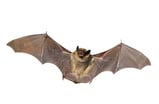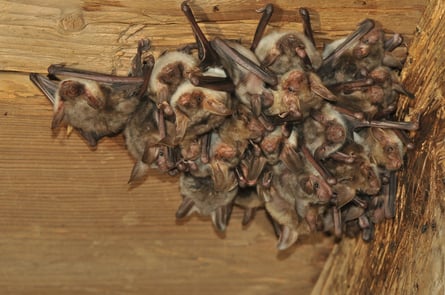Remove and Prevent Bat Nesting In Your NJ or PA Home
 What are bats? You've probably heard of bats as rabies spreading flyers with fangs and an appetite for human blood on Halloween. For this reason, bats are very misunderstood creatures. Did you know that bats are actually very beneficial to the environment and are not innately attracted to humans? These nocturnal creatures spend most of their time searching for insects, preferably mosquitoes. As they dip and dive with fast speeds, bats can eat their weight in bugs every night. Bats are nature's pest control, helping reduce active mosquito populations. Even if you don't see bats, they are very prevalent throughout New Jersey and Pennsylvania.
What are bats? You've probably heard of bats as rabies spreading flyers with fangs and an appetite for human blood on Halloween. For this reason, bats are very misunderstood creatures. Did you know that bats are actually very beneficial to the environment and are not innately attracted to humans? These nocturnal creatures spend most of their time searching for insects, preferably mosquitoes. As they dip and dive with fast speeds, bats can eat their weight in bugs every night. Bats are nature's pest control, helping reduce active mosquito populations. Even if you don't see bats, they are very prevalent throughout New Jersey and Pennsylvania.
What kinds of bats live in New Jersey and Pennsylvania?
There are over 1,400 species of bats across the world, but only two dominate New Jersey and Eastern Pennsylvania: the little brown bat and the big brown bat. True to their names, the little brown bat is little and the big brown bat is you guessed it, big. Little Brown Bats are about the size of your thumb, with a wingspan of about 11 inches, whereas big brown bats have an average wingspan of 13-16 inches. Bats nocturnal mammals that move very quickly and do not want to interact with humans, so the chances of you getting close enough to differentiate them are slim.
How can I tell if I have bats?
When bats nest indoors, they find areas that are dark, undisturbed, and have easy access to the outdoors so they can feed at night. Such places include attics, wall voids, chimneys, and barns. According to The National Wildlife Federation, bats can withstand a temperature change of nearly 120 degrees Fahrenheit without suffering any damage during their overwintering phase. It’s not uncommon for homeowners to go several years without knowing that bats are nesting because they become so secluded.
The top signs that bats are in your house are:
- Piles of droppings in one corner of the attic or near the entry point
- Droppings on attic insulation
- Stains on the attic walls from urine
- Your attic has a strong smell of ammonia, which is caused by excrement
- Hearing small squeaking noises or scratching
- Seeing live or dead bats
If you see a bat in your closet or living room, it probably got there by accident. Bats can find openings in the attic that they think lead outside, only to find themselves lost in your bedroom and unable to find their way back.
Why do I have bats?

When bats nest indoors, they find areas that are dark, undisturbed, and have easy access to the outdoors so they can feed at night. Such places include attics, wall voids, chimneys, and barns. According to The National Wildlife Federation, bats can withstand a temperature change of nearly 120 degrees Fahrenheit without suffering any damage during their overwintering phase. It’s not uncommon for homeowners to go several years without knowing that bats are nesting because they become so secluded.
Are bats dangerous?
If you find yourself dealing with bats living in your attic or chimney, it's only normal to feel stressed and anxious. The good thing is that bats do not want to encounter humans. In fact, they choose protected spaces to remain safe against both inclement weather and organisms that they see as threats. This includes humans.
Bats become hazardous when they choose to live in your home due to the droppings and urine they consistently create. Not only are the conditions unsanitary, but it can begin emanating an unpleasant scent that can waft down below your attic and into your living spaces. If you see a bat in your closet or living room, it probably got there by accident. Bats can find openings in the attic that they think lead outside, only to find themselves lost in your bedroom and unable to find their way back.
Are bats protected?
According to New Jersey state law, there are very specific times of year that you can legally get rid of bats that are nesting in your home. The lifecycle of bats native to our area dictates the times that exclusion work can take place (highlighted in green) and the times that exclusion work cannot take place (highlighted in red).
- April 1st – April 30th – bats may be present, but pups are not yet born
- May 1st- July 31st – motherless bats and their flightless pups may be present in the roost
- August 1st – October 15th – bats may be present, but all bats should be flying
- October 16th – March 31st – bats find areas to overwinter
For this reason, sealing up a home with pups living inside will result in death because they are too young to escape.
The only time that bat exclusion services can be rendered are:
- April 1st- 30th
- August 1st- October 15th
For more information about state regulations in regards to handling bat nesting, click here.
How can I get rid of bats?
If you search online for ways to get rid of bats on your own, you'll find a lot of DIY tactics and methods that involve "natural" remedies or ultrasonic sound waves. Unfortunately, there is no research behind these claims. Unless an entry point is sealed, bats will continue to be drawn in year after year. If you have bats in your attic or chimney, call a wildlife removal or pest control company to handle the situation professionally.
The New Jersey Department of Health even states, “The only permanent method to get rid of bats from a home, and keep them out, is to exclude them by bat-proofing.”
How does Cooper get rid of bats?
We get rid of bats by using one-way bat tubes so they can fly out, but not reenter. Once the bats are out of the structure, our exclusion experts seal the entry points with a variety of permanent materials that prevent bats from getting back into the home. Watch the video below to see how our bat exclusion services work.
How soon can you get here?
At Cooper Pest Solutions, our goal is to provide fast, convenient service with the peace of mind that you are in good hands. We understand that pest problems can be stressful and overwhelming, so we strive to provide same day or next day service. Call us at 1-800-949-2667 to learn more about our bat exclusion services.

